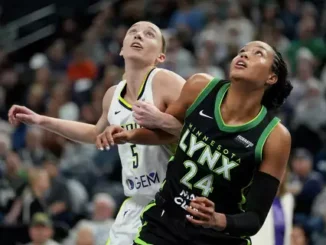
Athletes today face immense pressure from high expectations, peer influence, off-court distractions, and the intense scrutiny of social media. While support from coaches, teammates, and family can be crucial, sometimes additional help is necessary.
Fortunately, attitudes toward mental health have shifted in recent years. Seeking support from psychologists, once stigmatized, is now widely accepted across all fields, including sports.
UConn redshirt junior Azzi Fudd revealed that, after years of hesitation, she finally decided to work with a psychologist to improve her mindset while recovering from injury. UConn provides student-athletes with access to mental health professionals, including counselors and psychologists.
“Talking to someone has been incredibly helpful,” Fudd shared during the Spokane Regional of the NCAA Tournament. “It’s made a huge difference for me this year, and having that ongoing support has really helped.” She credited the decision with giving her the focus needed to block out distractions, stop worrying about her knee, and gain confidence in her training.
Paige Bueckers also prioritizes mental health and works with a sports psychologist. “A lot of us on the team do,” she said. “It’s a judgment-free space where you can talk about anything, calm your nerves, and refocus.”
Coach Geno Auriemma emphasized that having someone outside the team to confide in can be beneficial. Along with easing anxiety, a mental health professional helps players stay present and focus on their performance.
Bueckers echoed this sentiment: “There’s a lot of pressure during this time, and it’s easy to get caught up in expectations. I’ve been working on staying in the moment, being true to myself and my team, and enjoying every second.”
Fudd agreed, highlighting the importance of mental discipline. “Like Paige said, it’s a judgment-free zone. My main focus this year has been staying present and controlling what I can. I can’t let outside distractions affect me. Instead, I have to focus on what I can control and give my best effort.”



Be the first to comment